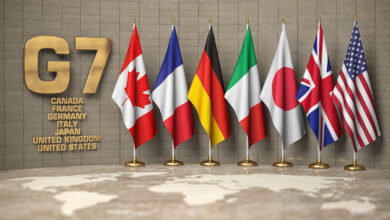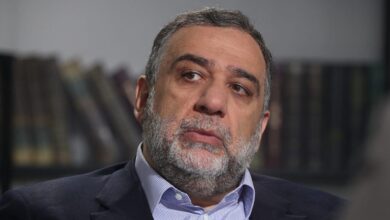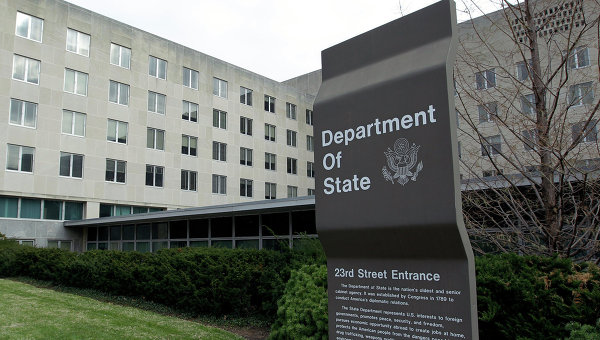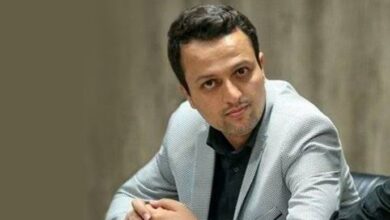
Speech by Foreign Minister Edward Nalbandian, entitled “The settlement process of the Nagorno-Karabakh issue” at the Armenia-Diaspora Sixth Pan-Armenian Forum.
Dear compatriots,
In a couple of months the 30th anniversary of the Karabakh Movement will be marked. Indeed, this remarkable date symbolizes the modern awakening of the Armenian nation, our strive for freedom and justice, for the protection of our rights; it symbolizes our unity and collective will.
The three decades is an essential period that allows to look back and assess elapsed path. Today I would like to present to you approaches of Armenia with regard to the settlement of the Nagorno-Karabakh conflict. For years these approaches have served as our main guidelines, and I am confident that in the future will continue to direct our efforts.
When I say “our,” of course I mean that these main approaches can indeed be considered not only Armenia’s, but the ones adhered to also both by Artsakh and Diaspora. Baku makes no differentiation in this sense, and we all together have been honoured with the title of “the number one enemy of Azerbaijan.”
Before passing to the approaches of Armenia, I would like to clarify that it is not my intention to make a comprehensive review within the framework of just one address. The order in which the approaches will be presented is not a matter of prioritization of one of them upon another since all of them have great significance for us.
Dear compatriots,
The first approach that I would like to touch upon relates to our determination to settle the conflict exclusively through peaceful negotiations.
Thirty years ago, the people in Artsakh and Armenia recalling the USSR legislation and the international law made petitions for the restoration of historical justice and respect of fundamental human rights. This has been our guideline from the outset of the Nagorno-Karabakh movement, and it has remained unchanged throughout the years. The approaches of Baku were right the opposite: like 30 years ago, today also it continues to rely on the use of force and the threat of use of force. This is the difference between the Armenian and Azerbaijani approaches. Azerbaijan responded to the peaceful demonstrations and demands by the pogroms against Armenians, followed also by the war crimes committed during the Karabakh war.
This year marks the twenty-fifth anniversary of one of such tragedies, the Maragha massacre, during which more than 50 peaceful civilians, including women, children and elderly, were brutally killed, and about as many people were taken hostage and tortured by the Azerbaijani armed forces.
Last April, in gross violation of humanitarian law, the Azerbaijani criminals killed and mutilated Armenian elders in the village of Talish, not far from Maragha. They killed a 12-year-old boy in the school yard and wounded his classmates. The captured Armenian soldiers were beheaded in front of cameras, and the images of this crime were posted on the social media. This is the face of the Azerbaijani armed forces, which has adopted the disgusting tactics of DAESH and other terrorist groups.
The same type of atrocities were committed against Armenians thirty years ago in Sumgait, weren’t they? Today international media labels Sumgait as the capital of jihadists in Azerbaijan and a threat for that country itself. As the saying goes “as you sow, so shall you reap.“
It’s obvious that Azerbaijan adopted the policy of complete cleansing of Artsakh from Armenians and its annexation by force. If during the Soviet period, Azerbaijan consistently pursued an undisguised programme of expelling Armenians from Nagorno-Karabakh, and many leaders of Azerbaijan publicly bragged about that, then during the war unleashed against Artsakh Baku explicitly exercised the policy of ethnic cleansing. Under these circumstances, Nagorno-Karabakh had to resort to self-defense to ensure its inalienable right to live and create in its homeland.
The barbarisms of Azerbaijan both during the first years of the Karabakh movement, and in April of 2016, leave no doubt that the struggle of the people of Artsakh for its rights, its self-determination has been just both in the past and in the present.
Dear compatriots,
The second approach, that we adopted for the settlement of the Nagorno-Karabakh conflict, is the international recognition of the implementation of Artsakh’s right to self-determination.
Today, the right of peoples to self-determination, along with the non use of force or threat of use of force and territorial integrity, is unequivocally enshrined as one of the fundamental principles of the settlement of the Nagorno-Karabakh conflict. As such, these three principles are reflected in the statements of the mediators – the Presidents of the OSCE Minsk Group Co-Chair countries – Russia, the United States and France, as well as in the documents of the Organization for Security and Co-operation in Europe and other international structures. The proposal of the Co-Chair countries includes the actual application of the right to self-determination – the determination of the final legal status of Nagorno-Karabakh through the free expression of will of its people, which must have an international legally binding force. That means legally binding also for Azerbaijan, and guaranteed by the international community.
Armenia has repeatedly stated that it accepts these proposals of the Co-Chairs, these principles as a basis for negotiations. Meanwhile, Azerbaijan has repeatedly refused to accept these principles, even refuses to join the international documents, which merely make a reference to them. It’s clear that no settlement is possible unless Azerbaijan accepts those principles of the international law. Instead, Baku prefers to invent fictitious scenarios, to ascribe imaginary proposals to the Co-Chairs. These mental exercises have nothing to do with the reality. As is known “a lie has no legs.” Each time the Co-Chairs make a statement on the outcomes of the meetings, it reveals how far the Azerbaijani fabrications are from the reality and how coherent is our stance with the approaches of the international community.
To put the record straight I would like to emphasize once again that the positions of the international mediators are expressed in five statements of the Presidents of the Co-Chair countries, which have been repeatedly reaffirmed, for example, last December in Hamburg by the Foreign Ministers of the Co-Chair countries. This is the position of the Co-Chairs, the only mediating format which enjoys the mandate of the international community.
The international community supports the Minsk Group Co-Chair countries and their proposals. I will bring only one example: the joint Declaration of the Riga Summit adopted by the 28 EU and 6 Eastern Partnership countries expressed support to the Co-Chair countries and the five statements issued by the Presidents of Co-Chair countries on the settlement of the Nagorno-Karabakh conflict. Azerbaijan remained faithful to its practice, opposed to that position, and thus found itself in isolation.
Dear compatriots,
The third approach, which also has a crucial role in the settlement of the issue, is the guarantee of the security of people of Nagorno-Karabakh. Ensuring safe and secure life in their homeland is another goal of the implementation of inalienable right of the people of Artsakh for self-determination. It is an international obligation to ensure safety of the people and Nagorno-Karabakh has earned this right also at the cost of significant sacrifices. The settlement should contain clear guarantees for the security of the people of Artsakh.
The militaristic rhetoric of Baku, dissemination of Armenophobia within its society by the leadership of Azerbaijan, regular ceasefire violations, continuous threats and provocative actions, April crimes leave no doubt that under inadequate security guarantees this conflict can’t be considered as resolved.
The Co-Chairs and the international community give due credit to this reality. The proposals of the Co-Chairs on the conflict settlement provide multi-layered security guarantees for Artsakh.
Dear compatriots,
The fourth approach refers to the responsible, constructive steps of Armenia in the negotiation process and the strict adherence to the previously reached agreements. Here as well, our approaches and those of Azerbaijan are absolutely different. Azerbaijan continuously tries to undermine the negotiation process, backtracks from its commitments and prior agreements.
I think it won’t be difficult to imagine how big efforts are needed to reach an agreement on the negotiation table, especially when one of the negotiating parties is Azerbaijan. However, Baku continues to oppose to the efforts of the international community and Armenia: it does not respect the reached arrangements and backtracks from them, as it happened in St. Petersburg (June 2010), Astrakhan (October 2010), Sochi (March 2011), Kazan (June 2011) and on other numerous occasions.
However, nothing goes unnoticed and enough is enough. The statements of the OSCE Minsk Group Co-Chairs aimed at bringing Azerbaijan back to its senses come to prove this old wisdom. The Co-Chairs started to identify Azerbaijan as the side initiating ceasefire violations, they call Baku to reaffirm its commitment to the peaceful settlement of the issue, to refrain from the escalation of situation, to respect and strictly adhere to the 1994-1995 ceasefire agreements, to refrain from criticizing the OSCE Minsk Group Co-Chair countries and respect their mandate, to give up efforts to shift the conflict resolution to other formats, to agree to the establishment of investigation mechanism of ceasefire violations.
However, Azerbaijan ignores all the appeals of the Co-Chair countries and continues to stick to its highly destructive stance undermining the peace process and deepening the distrust. The question arises, whether we should put so much efforts and energy in a process if Baku anyway would not respect and implement the agreements. The answer is clear: Armenia and Artsakh are advocates for the peaceful settlement, which can be reached solely through negotiations. The peace process has no alternative, and the Co-Chair countries, which present the approach of the international community, share this opinion.
Armenia, along with the Co-Chair countries, will continue the efforts towards the exclusively peaceful settlement of the conflict. That is why we don’t refrain from the negotiation process and the meetings.
At the same time, it is obvious that the agreements reached should be implemented, otherwise the peace process will not move forward. This also refers to the agreements reached during Vienna and Saint Petersburg Summits of last year. Here again unlike Azerbaijan, our views are in line with the Co-Chairs’ position.
Dear compatriots,
The fifth approach refers to Artsakh`s full participation in the negotiation process. We are convinced that Artsakh should have its decisive voice in the efforts aimed at the settlement of the conflict and establishment of lasting peace. The Co-Chairs share this opinion. Armenia undertakes consistent steps in this direction.
Today Azerbaijan refuses to recognize Artsakh as a negotiating party, as if it has forgotten that back in 1994 it was obliged to ask for a ceasefire from Artsakh and nail down that ceasefire with its signature together with Nagorno-Karabakh. The realities can’t be changed according to one’s caprices: one can try to ignore the reality, but it is impossible to avoid it for a long time, without eventually finding itself in a deadlock.
First and foremost, the settlement of the issue should take into account the rights of the people of Artsakh, which, regardless of the current legal status of Nagorno-Karabakh, are the same for all the peoples of the world and are enshrined in the UN Charter, the Universal Declaration of Human Rights, the International Covenant on Civil and Political Rights and other international fundamental documents. Nagorno-Karabakh can not be driven out from international processes simply because it doesn’t fit Azerbaijan, a country which anyway acts against any international standards of human rights and fundamental freedoms.
By including people into “black lists” and announcing international prosecution, the dictators can neither intimidate, nor prohibit both people-to-people contacts, and freedom of speech. It may have a boomerang effect. The sharp increase of the number of journalists and bloggers visiting Artsakh after the arrest of blogger Lapshin, as well as his messages to Azerbaijan after his release has a cold shower effect.
Dear compatriots,
The sixth approach concerns to the further raising of international awareness on Artsakh and the rights of its people.
Azerbaijan has no historical, legal or moral justification of its claims on Artsakh, and tries to fill that vacuum with falsifications. The army of mercenaries at Baku’s service are leveraged to this mission, which, as the recent corruption scandal of “Azerbaijani laundromat“ once again pinpointed, includes many well-known faces, who throw mud on us. It is true that “when throwing a mud on others, one gets his hands and even face dirty.”
Certainly, under these circumstances the activities aimed at raising awareness of the international community on the reality about the history of Artsakh and the rights of its people are of primary importance. As it is said “there is no need to prove the obvious“, however, perhaps it needs a regular reminding. In this regard, our Armenian brothers and sisters from Diaspora should continue to disclose the falsifications of Azerbaijan where it’s still needed.
Baku thinks that it can justify its claims for Artsakh by creating different myths. But those are merely balloons, which do not survive under the pressure of an empty air and pop one after another. As an example, let us take Baku’s favorite myth about Azerbaijan being a country of multiculturalism, multi-religion and tolerance. How can one speak about multiculturalism, when the Armenian monuments – churches and monasteries, cross-stones (khachkars) and cemeteries are being destroyed in Azerbaijan? How can one speak about tolerance when Armenians are introduced as genetic enemies of Azerbaijan in the textbooks? Relevant reports of the renowned international institutions continuously alert about these. What kind of tolerance is it when the Foreign Ministries of a number of countries directly warn their citizens with Armenian last names to refrain from visiting Azerbaijan, because they can be prosecuted simply for being an Armenian? And the reality is that, indeed, if the citizens of other countries of Armenian origin visit Baku, they appear behind the bars. These very unique manifestations of tolerance are typical for Azerbaijan, a country which wants to convince the whole world that the Armenians of Artsakh are its citizens. I think it’s clear what fate awaits every single inhabitant of Artsakh if he or she happens to appear in Azerbaijan’s claws. The April of 2016 is not the only proof of that, there are numerous examples.
Dear compatriots,
Our efforts aimed at the settlement of the Nagorno-Karabakh issue are anchored to these basic approaches. Today, our approaches are in line with the position of the international community and the Co-Chairs. I am confident that as a result of our joint efforts we will succeed in reaching the fair settlement of the conflict, and in establishing a lasting peace in the region.
The greatest pledge for such confidence is Artsakh itself that has proved its capability to establish a functioning governing system based on modern society, democratic institutions and rule of law. It is Artsakh with its armed forces, which are capable to give an adequate counterattack to any encroachments. It is Artsakh with its invincible generation, which had enjoyed the whole scent of freedom. It is Artsakh, which, by the definition of the President of the Republic of Armenia, “has not only the necessary fighting capacity, but it is also viable and competitive.“ Both Armenia and the Diaspora stand by Artsakh.
I thank you.








